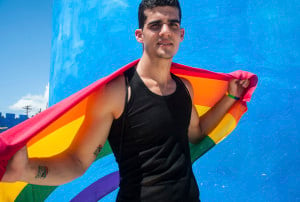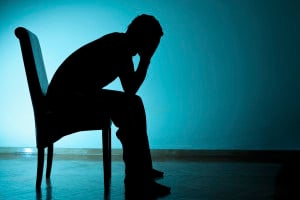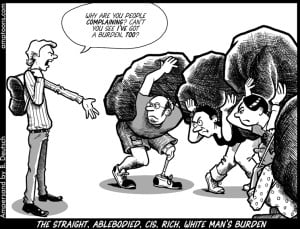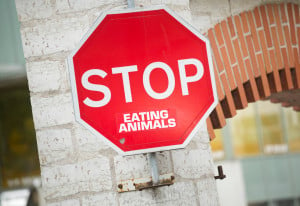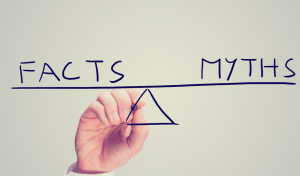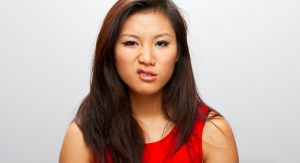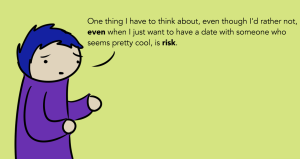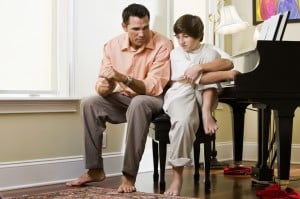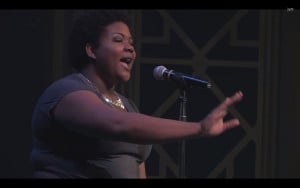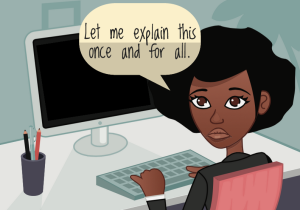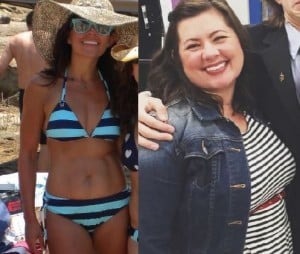As intersectional feminists, it’s important to acknowledge that we sometimes struggle with working with people who may not exactly look like us, love like us, talk like us, share the same values as us, and so much more.
And as someone that was undocumented for almost 17 years, and is queer in every sense of the word, I want to invite my LGBTQIA+ community and my immigrant community to reflect on the ways we treat each other, and what we can do to unapologetically fight side by side.
I know that there are a few organizations like Familia: Trans Queer Liberation Movement, Black Alliance for Just Immigration, the Queer Undocumented Immigrant Project, and others trying to take on undocumented AND LGBTQIA+ issues, but that’s not enough.
We need the entire LGBTQIA+ community advocating for immigrant rights, and we need all immigrants advocating for LGBTQIA+ rights.
And we need to acknowledge the ways our communities, identities, and lives intersect.
First though, we need to talk about why we aren’t working together, and here are 3 crucial things that have stood in the way of our solidarity:
3 Things Standing Between Us and Joint Struggle
1. We Are Taught To Think Our Struggles Are Single-Issued
When I first “came out” as queer, I was widely accepted at my predominantly White “liberal” High School.
That is, I was accepted because it was easier for the White students to “understand” my queer identity more than my identify as an immigrant, as a Black Latinx, and as a low-income student that benefited from the free-lunch program.
However, when I “came out” as undocumented in the same school, I was ostracized.
I lost most of my “close” friends. I often heard whispers as people passed by, calling me “illegal” and “wetback.” And I even remember a teacher tell me I wouldn’t be able to go far in life.
I wanted to fit it, and I thought the best way to do it was by joining queer and trans youth spaces in Boston, and finally joining the undocumented youth movement.
It was those spaces, however, where I first began to realize that immigrants were reluctant to talk about queer and trans issues, and that queer and trans spaces never talked about issues of migrants.
I was asked to not reveal my queer identity when I was recruiting undocumented youth from churches to join the movement. And I was once asked not to tell anyone I was undocumented at a meeting for queer and trans youth of color, because the youth might feel “uncomfortable” and “in danger”.
It’s not until later that I learned that as oppressed people, we sometimes think that our oppression is more violent than the oppression of others. But the reality is that we are all oppressed by many of the same systems.
In fact, the way in which systematic oppression in the United States works is by pinning marginalized communities against each other. This happens because if we upheld each other instead of playing oppression Olympics, we would gain exponential power that could more efficiently dismantle some of the systems of oppression that bring us down.
Because LGBTQIA+ and immigrant communities are heavily oppressed, they often only have time to think of how they are going to survive that day, thus not having the psychological space to think about the ways in which they’re oppression is also the oppression of another group of people.
2. We Criminalize Each Other
In fighting for my liberation as a queer person, I use to hear many homophobic and anti-femme comments from my immigrant community that made my queer identity feel like a shame, dirty, and unearthly.
One of the questions I use to get a lot was, “why do you want to be one of them?” — which was almost always followed by one of these two statements: “you want to infect everyone with HIV and AIDS?” or “you want to be a sex worker?”
And in the same way, as an undocumented person in queer and trans spaces, I always used to get “but you’re not like the rest of the illegals”.
The comments I was receiving were actually informed by the way in which society has violently and inaccurately imagined the “realities” of the LGBTQIA+ and immigrant communities — without actually engaging with all of the media produce about our own identities, in our own words.
3. We Do Not Realize We Can Be Both Immigrant and LGBTQIA+
Because the media influences the way in which we see the world, we often fail to realize that people embody multiple identities.
For example, immigrants that cross the border are usually portrayed solely as Mexicans by US media, and we usually get images of middle-aged migrant men. And queerness in the media is usually depicted as White men in the symbols of the “gay best friend,” the “feminine men” depicted either as a pervert, or a social outcast.
Because of these images, we fail to realize that immigrants can be queer and/or trans, and vise versa.
***
To be honest, it took me a long time to come to an analysis of how my undocumented reality and my queer reality intersected, and it was a frustrating process.
At first, I thought my only problems were hiding from la migra and not being able to have a federally recognized marriage, but I learned that my struggles were about more than just citizenship and same-sex marriage.
Here are 4 struggles the LGBTQIA+ and immigrant community share, and how we can work together:
1. Our Communities Are Strategically Funnelled In The Prison Industrial Complex
The LGBTQIA+ community is extremely vulnerable to incarceration, because sexuality has always been regulated from what we wear, to how we walk, what we drink, and the way we speak.
Laws like New York’s stop-and-frisk combined with their condom law (now over) strategically targeted people of color and the LGBTQIA+ community by labeling us as “prostitutes” — and criminalizing those who do engage in the sex industry as sex workers.
With a combination of gender policing and racial profiling, we were — and still are — being funneled into the prison industrial complex.
However, what we aren’t talking about it that many of these LGBTQIA+ folk that are funneled into the prison system are also immigrants, and some, undocumented. We don’t hear about this because many are shipped to immigration detention centers, where they are put in deportation procedures.
In detention centers, trans undocumented womyn make up 25% of sexual assault cases, though there is only 1 trans womyn out of every 500 undocumented migrants in detention.
Undocumented migrants face the possibility of being detained every single day because they have no legal protection. Immigration can show up to their homes unannounced, to their jobs, to their schools, to the emergency room, etc. and pick them up to deport them.
Likewise, LGBTQIA+ folk can be falsely accused by the police, or by neighbors, and detained. These are the forces of homophobia, transphobia, femmephobia, and xenophobia all working together at the same time.
So how can we address this problem and work as a community?
1. When we advocate for prison abolition, it is our duty to also highlight the violence of immigrant detention centers, because often enough, people do not see this form of incarceration as part of the prison industrial complex.
2. For those of us doing community work, we need to expand our analysis, and always think about how people outside our community are affected by prison. If we are an LGBTQIA+ organization, we need to invest in resources and people that can help us expand to have a pro-migrant and anti-racist analysis.
If we are an immigrant rights organization, we must make it a duty to adopt a pro-LGBTQIA+ culture.
3. We cannot only be anti-prison, but we must also be publicly anti-deportation, anti-gender policing, anti-homophobia, anti-transphobia, anti-racism, etc.
2. Our Communities Are Prone To Chronic Homelessness
As many in the LGBTQIA+ community know, when we “come out” to those that we depend on, we always risk rejection — which is also parallel to coming out as “undocumented.”
For example, LGBTQIA+ youth may be kicked out of their homes if their parents do not accept them, and thus become homeless. Undocumented folk are sometimes kicked out of the places they rent when their landlords, or housemates find out that they are undocumented.
Something we need to talk about is that in the process of being kicked out, LGBTQIA+ youth may not take their ID’s with them and are denied entry to homeless shelters. I know this to be true because as a queer person I sometimes needed a place to sleep, and I was asked for identification since some shelters have government funding and can only serve citizens and permanent residents.
Other ways in which undocumented folk are prone to homelessness is that in order to rent an apartment, people are often asked for their drivers’ license, or a form of identification. This happened to me often, so my options of finding migrant-friendly housing were always extremely limiting.
In order to work together to address some of these issues we need to do the following:
1. As individuals, we need to create a living environment that is pro-migrant and pro-LGBTQIA+. For example, when we advertise rooms for rent, we need to be explicit in saying things like “immigrant friendly” or something like “queer and trans” friendly.
2. Immigrant rights organizations and LGBTQIA+ organizations should work together to stop homeless shelters from asking for proof of documentation.
3. Every time we see someone homeless, it is our duty to acknowledge them as they are people. They are alive — they exist and are not dead! Sometimes, a smile, or a hello can make a huge difference.
3. Access To Healthcare Is Nearly Impossible For Our Communities
First, let me start by saying that undocumented people in the US have no direct access to healthcare. Some of us have received it because of individual state laws that are required to give healthcare to all toddlers for example, etc.
However, other than that, we depend on free clinics, or alternative forms of healthcare.
The LGBTQIA+ community also experiences denial to healthcare in various ways. For example, a lot of hospitals are not trained on how to be LGBTQIA+ friendly, and may perpetuate homophobia or transphobia, thus putting the community in danger. Transgender folk that wish to have a medical transition often can’t because health policies may not cover transition, and because it’s crazy expensive!
To have access to better, or any healthcare we need to work together by:
1. Sharing resources with each other of places that are both migrant friendly and LGBTQIA+ friendly.
2. Citizen LGBTQIA+ folk with access to healthcare should always ask their health providers what their policies are for undocumented immigrants, and challenge them when they can.
3. Undocumented migrants that may have good home remedies should also share their knowledge with the LGBTQIA+, for those forms of knowledge are often better than US medicine.
4. We Are Often Discriminated At Work
For undocumented immigrants, and those with status, there is a lot of racism and xenophobia at the work place.
For example, the other day, I was walking by a restaurant, and there were two job announcements: a position for a dishwasher, which was written in Spanish, and a position for a cashier, written in English. Clearly this was discrimination because even if one was bilingual, the message was clear: non-migrants were being encouraged to apply to the cashier position.
Undocumented immigrants face a lot of workers rights violations.
When I worked under the table, I was paid less than minimum wage, and there were times my manager clocked me out hours before I left work.
When I retaliated, I was threatened with getting fired, or he’d call immigration on me. It was coerced labor.
The LGBTQIA+ community is also prone to work discrimination and unemployment because many places will use the excuse that our gender presentation is no “professional”, or they’ll resort to petty reasons for firing us as a loophole to worker protection laws. Not to forget, transgender folk are often denied jobs, or disrespected at the workforce in marginal ways.
To address this issue, we need each other:
1. First, we need to work together to fight for unions. Many workers unions fight for the rights of undocumented workers to get paid fair wages, and for the protection of the LGBTQIA+ community.
2. If you’re documented, you need to stand up to your bosses/managers when they mistreat the undocumented workers. Likewise, if you are an undocumented, or migrant worker, you need to also stand up for anti-LGBTQIA+ treatment at work.
3. Both LGBTQIA+ and migrants need to work together to demand change at the workforce, the more unity, the stronger the battle.
***
While these are some of the commonalities we share as immigrants and LGBTQIA+ folk, it is important to always think of creative ways to be in solidarity with each other, because allyship is an action, not an identity.
For organizations trying to work at the intersections of migration and LGBTQIA+ issues, you do not need to reinvent the wheel; you need to see who is doing the work, and help allocate funding for them, and make public statements on your positions.
There is a difference between being a “public” ally and a “private” ally. Publicity allows for honest accountability.
[do_widget id=’text-101′]
Alan Pelaez Lopez is a Contributing Writer for Everyday Feminism and an Afro-Indigenous migrant that grew up in Boston via La Ciudad de México, documenting their existence as an (un)docuqueer poet, jewelry designer, and a huge Frida Kahlo fan. Alan is currently in graduate school pursuing a degree in Comparative Ethnic Studies in the Bay Area, and a member of Familia: Trans, Queer Liberation Movement.
Search our 3000+ articles!
Read our articles about:
Our online racial justice training
Used by hundreds of universities, non-profits, and businesses.
Click to learn more


